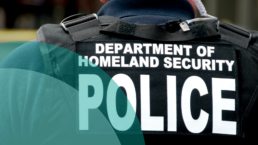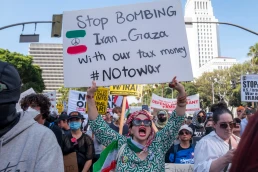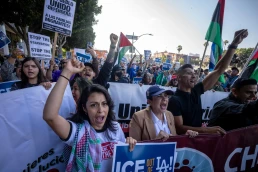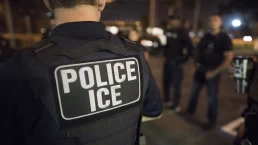A new perspective on the department of homeland security.
By Andrea Mazzarino, Tom Dispatch
A relative of mine, who works for the Department of Homeland Security (DHS) compiling data on foreigners entering the United States, recently posted a curious logo on his Facebook profile: a white Roman numeral three on a black background surrounded by 13 white stars. For those who don’t know what this symbol stands for, it represents the “Three Percenters,” a group that the Anti-Defamation League has identified as an anti-government militia. Its members have a record of violent criminal attacks and strikingly partisan activity, including arrests and guilty pleas in connection with the bombing of a Minnesota mosque in 2017 and appearances as “guards,” carrying assault-style weaponry, at several pro-Trump rallies. Six of its members have been charged with plotting to assault the U.S. Capitol on January 6, 2021.
When my husband, a Naval officer of nearly 20 years, saw this symbol on a family member’s Facebook page, he pointed out to me that, despite the Hatch Act, created to ensure nonpartisanship among federal workers, DHS employees are not always held accountable for exercising “free speech” that would violate that law. The Three Percenters claim that they’re protesting government tyranny. The roman numeral itself refers to a debunked claim that only 3% of Americans in the original 13 colonies took up arms against the British in the Revolutionary War.

What does it mean that an employee of the Department of — yes! — Homeland Security can openly and proudly promote a homegrown militia whose members have threatened and attacked American lawmakers and police? Sadly enough, this fits all too well an agency that national security expert Erik Dahl of the Costs of War Project recently described as looking the other way in the face of rising far-right extremism. That includes anti-government, white-supremacist, and anti-Semitic groups, armed and otherwise. Such right-wing militias and extremist outfits, as Dahl makes clear, have killed an increasing number of people in this country since the 9/11 attacks, significantly more than groups inspired by foreign Islamist organizations like al-Qaeda. And yet, in both its public statements and policies, the domestic agency created after the 9/11 attacks to keep this country “secure” has consistently focused on the latter, while underestimating and often ignoring the former.
Recent Posts
Is A Citizens United 2.0 Right Around The Corner?
July 15, 2025
Take Action Now Is it possible for American democracy to be further degraded by the influence of billionaires? Thanks to champion of the working…
U.S. Leaders Gave Up On Diplomacy With Iran. We Must Make Them Return To It.
July 15, 2025
Take Action Now Building an antiwar movement means preventing the systemic U.S. aggression that creates the conditions for war.By Hanieh Jodat,…
What To Do When You See ICE In Your Neighborhood
July 14, 2025
Take Action Now How can you deter the Trump administration’s immigrant deportation machine when it pops up in your community? Follow these…
ICE Campaign Of Violence Will Lead To More Deaths
July 14, 2025
Take Action Now Jaime Alanis’s death shows the horrific consequences of a secret police force behaving with utter impunity.By Natasha Lennard, The…




